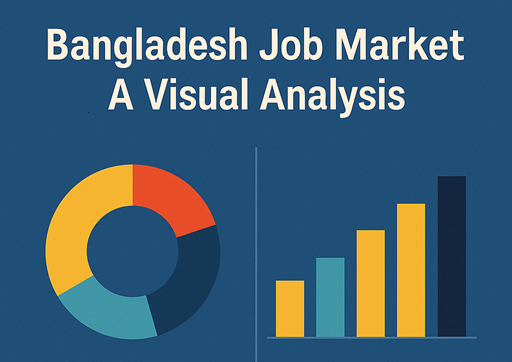
Bangladesh Job Market: A Visual Analysis
Published on: July 12, 2025
Bangladesh Job Market: A Visual Analysis
An interactive exploration of Bangladesh's economic journey, employment landscape, and the skills shaping its future. Based on the 2025 in-depth market report.
From 'Basket Case' to Growth Engine
Bangladesh has engineered one of the most impressive economic turnarounds, with its GDP soaring over five decades.
Nominal GDP Growth (in Billion USD)
This dramatic growth laid the foundation for the modern labor market but also masked underlying structural challenges.
The Great Economic Rewiring
The economy has profoundly shifted from agriculture to industry and services, but employment hasn't kept pace.
Share of GDP by Sector (%)
Share of Employment by Sector (%)
Notice the disconnect: Industry contributes massively to GDP but employs a smaller share of the workforce, while agriculture remains the largest employer despite its shrinking economic footprint. This imbalance is a key source of labor market tension.
The Paradox of Progress
A low overall unemployment rate masks a severe and worsening crisis of joblessness among educated youth.
Unemployment Rates by Group (%)
The Sobering Reality
The data reveals a shocking disparity. The unemployment rate for university graduates is roughly three times higher than the national average.
This points to a systemic breakdown: an oversupply of graduates, a labor market that cannot absorb them, and a deep disconnect between university curricula and industry needs. Obtaining a degree, paradoxically, seems to make finding a job more difficult for many.
Key Statistic:
A staggering 60-70% of graduates struggle to find a job 1-2 years after graduation.
The 2025 Skillset
In today's market, specific, demonstrable skills are increasingly eclipsing traditional academic credentials.
Top 5 In-Demand Hard Skills
- 💻Python
- 🔗Blockchain
- 🗃️SQL
- ☁️AWS (Cloud)
- 📋Project Management
Top 5 Critical Soft Skills
- 👥Teamwork & Leadership
- 🧠Analytical Thinking
- 💡Problem-Solving
- 🗣️Communication
- 📈Lifelong Learning
New Frontiers of Work
The job market is not just about skills; it's about new industries, company structures, and ways of working.
MNCs & Global Hubs
Multinational corporations are increasingly setting up development and support hubs in Bangladesh, seeking skilled talent at a competitive cost. These roles offer global exposure but demand international standards of communication and professionalism.
The Rise of Remote Work
The global shift to remote work has opened up unprecedented opportunities for Bangladeshi talent to work for international companies without leaving the country. This requires self-discipline, strong digital literacy, and the ability to collaborate across time zones.
Diversified Local Giants
Local conglomerates are rapidly diversifying from traditional sectors into tech-driven services like FinTech, EdTech, and HealthTech. These companies offer a unique blend of local market understanding and high-tech ambition, creating diverse job roles.
Future Hope & Probable Skills to Learn
While challenges exist, the future is bright for those who prepare. The key is to focus on skills that are resilient to automation and in high demand globally.
AI & Data Science
Beyond just coding, this involves understanding data models, machine learning algorithms, and how to derive business insights from data.
Cybersecurity
As businesses digitize, the need for experts who can protect digital assets from threats is exploding.
Green Technology
With a global focus on sustainability, skills in renewable energy, waste management, and sustainable agriculture are becoming highly valuable.
Digital Marketing & E-commerce
Expertise in SEO, content strategy, and managing online marketplaces is crucial for the rapidly growing digital economy.
Building a Future-Ready Workforce
An integrated action plan for policymakers, educators, industry, and individuals.
- Move beyond isolated initiatives to a comprehensive national workforce plan.
- Fully empower the National Skills Development Authority (NSDA) with resources and authority.
- Incentivize private sector training with subsidies for hiring fresh graduates.
- Implement a "Just Transition" strategy with social safety nets and reskilling for displaced workers.
- Reform government job recruitment (BCS) to prioritize practical skills over rote memorization.
- Shift from a degree-focused to a skill-focused paradigm.
- Mandate deep industry collaboration for curriculum co-design.
- Implement mandatory, credited internships for all degree programs.
- Integrate globally recognized industry certifications (AWS, Google, etc.) into curricula.
- Prioritize project-based learning to actively cultivate soft skills like critical thinking and teamwork.
- Adopt a long-term "talent farming" strategy instead of short-term "poaching".
- Embrace and scale work-based learning and apprenticeship programs.
- Invest in training fresh graduates to build a loyal, capable, and long-term workforce.
- Rethink entry-level job requirements to focus on potential and core competencies.
- Focus relentlessly on acquiring demonstrable, in-demand hard and soft skills.
- Build a tangible portfolio of work (e.g., GitHub for developers, Behance for designers).
- Embrace lifelong learning as a core discipline for continuous upskilling.
- Develop a "T-shaped" professional profile: deep expertise in one area, broad knowledge in others.
- Network strategically by joining industry associations, attending meetups, and using platforms like LinkedIn.

Written by
Sajid Hasan
Sajid is a writer and analyst focusing on market dynamics and strategic business movements in South Asia.


